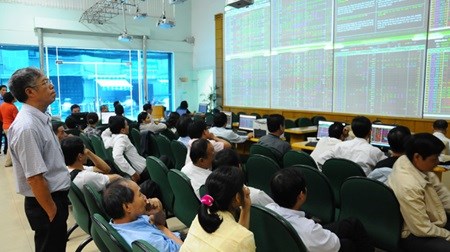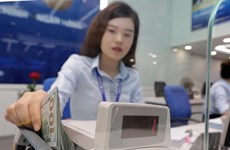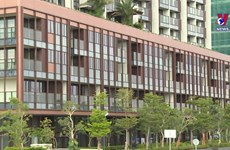Domestic market outlook still positive
Vietnam's shares are heavily influenced by financial moves in global markets, but experts are keeping a positive outlook for the domestic market in the last months of 2015.
 Illustration image. Photo: viettimes
Illustration image. Photo: viettimesVietnam's shares are heavily influenced by financial moves in global markets, but experts are keeping a positive outlook for the domestic market in the last months of 2015 – a view that is backed by solid performance of the economy and business sector.
This was the main focus of an online discussion about the outlook of Vietnam's stock market under the impact of foreign exchange (forex) and global oil volatility, which was hosted on September 9 by the Dau tu Chung khoan (Securities Investment) newspaper.
"Investors should keep a long-term view of investment activity," said Hong Tuan, senior analyst at MB Securities Co. "Despite the short-term volatility, the market development always keeps in line with the economic prospect and earning outlook of listed companies in the long run."
According to Tuan, the domestic economy is on the right track of recovery with the annual GDP growth expected to reach 6.4 to 6.5 percent by year-end. Inflation remains at a low level, and stable interest rates are supporting business production.
The dong has fallen more than 5 percent against the US dollar this year, but the decline is much lower compared to other currencies.
Meanwhile, the earnings prospect of listed companies was positive, Tuan said, with the average growth rate expected to be 13 to 15 percent in 2015. Valuation of Vietnamese shares also is relatively cheap, with a price-earning (P/E) ratio of 9 to 10 times, compared with popular ratios of 15 to 20 percent of other countries in the region.
The Vietnamese stock market took a big hit in early August following the Chinese stock rout and steep fall of its currency. The VN-Index lost about 7 percent in August.
P/E of more than 50 percent of listed companies have dropped below 8 times, and the average market return is about 8 percent this year, higher than the current yearly deposit interest rate at banks.
"I think low valuation of stocks will have a certain appeal to investors in comparison with other assets in the long term," said Dao Hong Duong, head of analysis division at PetroVietnam Securities Incorporated.
According to many analysts, the US dollar will not be attractive in the long term as the US-denominated deposit interest rate is currently low at just 0.75 to 1 percent per year, while the greenback is predicted to rise about 3 to 5 percent in upcoming years.
Regarding realty asset, the recent development has been seen in only several segments, particularly apartments for low- and middle-income earners. On the other hand, the profitability prospect of the real estate sector will also drop along with a large supply of products being launched in the future.
However, analysts also warned about the market volatility in the short term as the domestic market is being influenced by many external factors, including an impending interest rate hike by the US Federal Reserve (Fed) and losses of global oil.
The dong has fallen more than 5 percent against the US dollar this year, but the decline is much lower compared to other currencies.
"I think the Fed will unlikely raise interest rates in September," said Nguyen Xun Binh, deputy director of analysis at Bao Viet Securities Co.
Binh pointed out three obstacles to the Fed's decision, including an inflation rate currently below its target of 2 percent, depreciation pressure of the Chinese currency and signs of easing monetary policy of European Central Bank.
Even if the Fed lifted its rate of less than 0.5 percent, this would have little impact on the monetary policy of Vietnam's central bank this year because this factor was accounted for in the central bank's recent currency devaluation, Binh said.
The State Bank of Vietnam has devalued the dong by 3 percent this year, while also expanding the dong's trading band from 1 percent to 3 percent at commercial bank after China let the yuan fall more than 5 percent in August.
Bui Quoc Dung, head of the central bank's monetary policy department, said the national balance of payment could turn deficit in the latter half of the year if exports did not improve. However, with the current foreign currency reserve of 37 billion USD and 10 tonnes of gold, the central bank would have resources to stabilize the exchange rate until the first quarter of 2016.
According to Doan Thi Thanh Truc, analysis director at Viet Dragon Securities Co, investors have taken action to prepare for the Fed's decision in recent months. Capital inflows in the emerging markets declined from 40 billion USD in July to 35 billion USD in August. These figures were much lower than the monthly average of 60 billion USD in previous years.
"If the Fed hikes interest rates, the domestic market will likely be affected in several sessions," Truc said. "The market movements later will depend on prospects of Vietnam's economy, as well as the performance of listed companies." Truc said.-VNA













